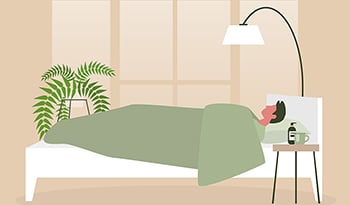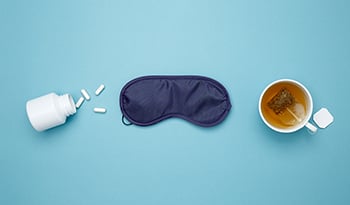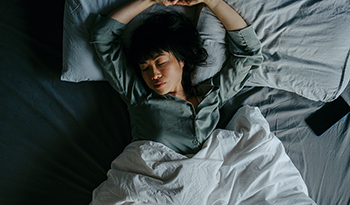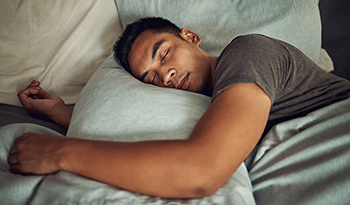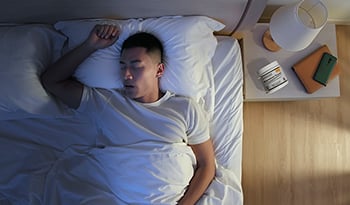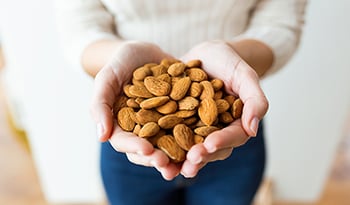How Stress And Sleep Affect Your Skin: A Doctor's Guide
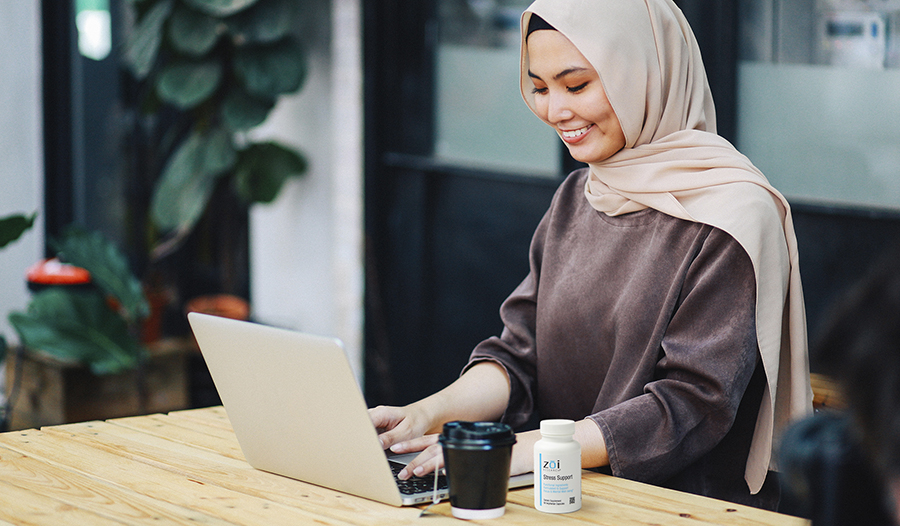
Key Takeaways
- Stress increases cortisol, which can lead to acne, inflammation, and premature aging.
- Lack of sleep disrupts skin repair, causing dullness and dark circles.
- A holistic approach combining lifestyle changes, targeted skincare, and supplements offers the best results.
The Science Explained: How Stress And Sleep Affect Your Skin
Ever noticed a surprise breakout during a stressful week or dull skin after a few sleepless nights? It's not a coincidence. This is the brain-skin axis at work.Though seemingly unrelated, sleeping habits, skin health, and stress levels stay interconnected in more ways than one.
The Role of Cortisol (The "Stress Hormone")
If you aren’t sleeping well, your stress hormone cortisol may be elevated. Inversely, if you are stressed, your cortisol levels may be increased, causing difficulty falling and staying asleep. In turn, high cortisol levels can increase inflammation in the body. Inflammation can make your skin acne-prone and more sensitive, with an increased risk of allergic reactions. Cortisol also breaks down the proteins that keep your skin smooth and healthy.
A study in Clinical and Experimental Dermatology found that participants who slept seven to nine hours each night had more moisturized skin and skin better able to protect and heal itself from ultraviolet light exposure than participants who received five or fewer hours of sleep. Skin does most of its restoration while you are sleeping. Skin cells regenerate more quickly at night while also producing collagen, the protein that gives skin its elasticity and volume.
High cortisol levels due to poor sleep and stress stimulate the degradation of collagen and elastin. That leads to fine lines and wrinkles that are associated with chronic stress. It’s no wonder that chronic stress and insomnia speed up skin aging considering these effects.
Common Skin Issues Caused by Stress And Poor Sleep
- Acne and Breakouts
- Dryness and Dehydration
- Rashes and Hives
- Flare-ups of Eczema, Psoriasis, and Rosacea
- Dull Complexion
- Dark Circles and Puffy Eyes
- More Pronounced Fine Lines
But there is hope. Many natural supplements may help support your sleep, skin, and stress. These products can help reduce stress, improve sleep quality, and support healthy skin.
Your Action Plan: How to Protect Your Skin
Step 1: Manage Your Stress Levels
Lower the stress hormone cortisol with daily mindfulness practices. Even five minutes of meditation or simple breathwork can calm your nervous system and, in turn, your skin.
Step 2: Prioritize Sleep Hygiene
Stick to a consistent sleep schedule, even on weekends. Create a relaxing, screen-free "wind-down" routine an hour before bed to help your body produce melatonin naturally.
Step 3: Adapt Your Skincare Routine
When stressed, focus on gentle, supportive care. Switch to a hydrating cleanser and use a calming moisturizer with ingredients like hyaluronic acid to strengthen your skin’s barrier. Always wear sunscreen.
Step 4: Target the Issue from Within with Supplements
Support your body from the inside out. Consider adaptogens like Ashwagandha for stress, Magnesium for sleep quality, and Collagen to help rebuild your skin’s foundation.
Best Supplements For Better Sleep
With so many sleep aids on the market, it can be challenging to choose the right one for yourself. Looking for these natural health ingredients in a sleep aid product can help you select supplements that potentially provide sleep support.
Melatonin for Sleep Support
Melatonin is likely the most famous natural sleep aid to date, and for good reason.
Many studies have determined that melatonin can improve various aspects of sleep. One analysis of several studies found that melatonin improved sleep quality reduced the time needed to fall asleep, and increased total sleep time in children and adults.
Valerian Root for Improved Sleep
Commonly used for sleep disorders, valerian root is especially known for helping with insomnia, or the inability to sleep.
Valerian can potentially improve your sleep, and it can also be good for relaxation. It has often been called “nature’s valium.”
The plant root is known for its sedative effects, and the flowers got traditionally used to make perfume. The valerenic acid in valerian root has been found to inhibit the breakdown of gamma-aminobutyric acid (GABA) in the brain. Low GABA levels are associated with poor sleep and anxiety.
Lemon Balm for Sleep Quality
Lemon balm has traditionally gotten used to ease anxiety and help with insomnia. The rosmarinic acid in lemon balm may be responsible for these calming effects.
According to one study, lemon balm combined with valerian root significantly improved sleep quality in the study participants. Another study found those who took lemon balm felt an increase in calmness and reduced alertness. Both effects would contribute to an improved ability to fall asleep.
You can consume lemon balm as a supplement or drink it as a tasty, comforting tea infusion.
Best Supplements For Skin Health
Your skin is your largest organ and is the protective barrier between you and the outside world. It’s important to take good care of your skin, especially with the increased stress levels of today’s world and poor sleep quality on the rise.
Shea Butter for Healthy Skin
The ultimate skin moisturizer, shea butter, gets touted as one of the best topical applications for skin health. Derived from the shea tree seed, shea butter remains indigenous to Africa.
With its anti-inflammatory properties, shea butter may help fight skin breakouts and offer healing for cuts and wounds. Studies show shea butter significantly reduces inflammatory markers for tumor necrosis factor, interleukins, and cyclooxygenase-2 (COX-2).
High in antioxidants, shea butter may also help slow the aging process for your skin.
Shea butter can be applied all over and is ideal for soothing dry and irritated skin.
Calendula for Skin Health
Extracted from the flowers of marigold, calendula has many potential benefits to the skin. Native to the Southwestern United States, Central America, and South America, it is believed that native marigold seeds were taken from the Aztecs by early Spanish explorers and used to cultivate marigold gardens in Spain.
Calendula is antibacterial, antifungal, and anti-inflammatory. It has traditionally been used by healers in the deserts of Arizona and globally to soothe various skin conditions, including rashes, wounds, dermatitis, eczema, acne, and psoriasis.
One study found that calendula has SPF properties and may be useful as a natural sunscreen.
Calendula may also improve the overall appearance of your skin. Studies have found that calendula may promote skin firmness and hydration.
Retinol for Better Skin
Due to its ability to increase collagen production, retinol is a desirable supplement for helping with skin rejuvenation.
In addition, retinol stimulates angiogenesis, or the production of new blood vessels, in the skin. That helps improve skin tone and increase the flow of needed nutrients to repair the skin.
Retinol is also known to reduce and fade age spots, dark spots, and blemishes on the skin’s surface. Its skin firming qualities potentially make retinol a great undereye treatment to smooth and tighten the skin under and around your eyes.
Because retinol can increase your skin’s sensitivity to the sun, it should be applied in the evening.
Best Supplements For Stress
Stress is at an all-time high, it seems. You can always benefit from natural stress support in your daily routine. Discover these top supplements to help manage your stress naturally.
Ashwagandha for Stress Support
Ashwagandha is an adaptogenic herb native to India, Africa, and the Mediterranean derived from Withania somnifera roots. Adaptogens can help your body manage the side effects of stress in a variety of ways.
Ashwagandha may help lower cortisol, one of your primary stress hormones. When elevated, cortisol can contribute to weight gain, especially in the abdomen, high blood pressure, and feelings of anxiety or depression.
One study found that adults who remained chronically stressed and took ashwagandha supplements had a significant decrease in cortisol levels, up to 30 percent reduction, compared to those who did not take the supplement.
Magnesium May Improve Stress Response
Magnesium is a vital mineral needed for many processes in your body to work correctly. It’s often discussed regarding heart health and muscle function but rarely as a supplement for stress support.
Studies have found that there is an inverse relationship between magnesium and cortisol. The higher the magnesium, the lower the cortisol levels. Stress depletes magnesium levels, but you need magnesium to respond to stress appropriately.
Many people are magnesium deficient but are likely unaware. While found in many plant-based foods like beans, legumes, nuts, and leafy greens, magnesium gets stripped from food during food processing. Considering the number of processed foods modern eaters consume, this is a major factor in magnesium deficiency.
Anxiety, insomnia, and irritability are all signs of magnesium deficiency. It can be difficult to detect a deficiency in magnesium because most of it gets stored in the bones and other tissues. Only 1% gets found in the blood, so plasma levels remain unreliable for diagnosing magnesium deficiency.
Magnesium helps to support stress by interacting with GABA receptors and supporting its calming actions. It also regulates glutamate, an excitatory chemical messenger, and is necessary for dopamine synthesis, a feel-good hormone. Each of these actions helps your body respond to stress healthily.
Lavender for a Healthy Stress Response
Lavandula, native to the Mediterranean region, is commonly known as lavender. It belongs to the mint family along with 46 other flowering plants.
Widely known as a calming herb, there is science behind its peaceful effects. Studies show that lavender can reduce anxiety and improve sleep quality while also helping to prevent stress and depression.
Lavender has also been found to affect the parasympathetic nervous system, which controls your body’s physiological processes related to stress, such as breathing rhythm, heart rate, and hormone secretion. Lavender may also help lower heart rate and adrenaline levels while also slowing breathing.
Lavender can be used as an essential oil for inhalation as a topical in creams and lotions and can be taken orally as a dietary supplement.
The Bottom Line
The realization that sleep, skin, and stress are all intertwined in a web of biological processes happening in the body can be eye-opening.
Ensuring proper sleep and good stress management helps to maintain healthy skin. Just as good sleep helps to reduce stress, and reduced stress helps to ensure better sleep. Supporting these three all-important areas remains critical for good health and longevity. Natural supplements offer many safe and reliable solutions for healthy sleep, skin, and stress support.
References:
- Chae M, Bae IH, Lim SH, Jung K, Roh J, Kim W. AP Collagen Peptides Prevent Cortisol-Induced Decrease of Collagen Type I in Human Dermal Fibroblasts. Int J Mol Sci. 2021;22(9):4788. Published 2021 Apr 30. doi:10.3390/ijms22094788
- Hirotsu C, Tufik S, Andersen ML. Interactions between sleep, stress, and metabolism: From physiological to pathological conditions. Sleep Sci. 2015;8(3):143-152. doi:10.1016/j.slsci.2015.09.002
- Leproult R, Copinschi G, Buxton O, Van Cauter E. Sleep loss results in an elevation of cortisol levels the next evening. Sleep. 1997;20(10):865-870.
- Ferracioli-Oda E, Qawasmi A, Bloch MH. Meta-analysis: melatonin for the treatment of primary sleep disorders. PLoS One. 2013;8(5):e63773. Published 2013 May 17. doi:10.1371/journal.pone.0063773
- Meyerhoff DJ, Mon A, Metzler T, Neylan TC. Cortical gamma-aminobutyric acid and glutamate in posttraumatic stress disorder and their relationships to self-reported sleep quality. Sleep. 2014;37(5):893-900. Published 2014 May 1. doi:10.5665/sleep.3654
- Cases J, Ibarra A, Feuillère N, Roller M, Sukkar SG. Pilot trial of Melissa officinalis L. leaf extract in the treatment of volunteers suffering from mild-to-moderate anxiety disorders and sleep disturbances. Med J Nutrition Metab. 2011;4(3):211-218. doi:10.1007/s12349-010-0045-4
- Lin TK, Zhong L, Santiago JL. Anti-Inflammatory and Skin Barrier Repair Effects of Topical Application of Some Plant Oils. Int J Mol Sci. 2017;19(1):70. Published 2017 Dec 27. doi:10.3390/ijms19010070
- Verma N, Chakrabarti R, Das RH, Gautam HK. Anti-inflammatory effects of shea butter through inhibition of iNOS, COX-2, and cytokines via the Nf-κB pathway in LPS-activated J774 macrophage cells. J Complement Integr Med. 2012;9:. Published 2012 Jan 12. doi:10.1515/1553-3840.1574
- Eghdampour F, Jahdie F, Kheyrkhah M, Taghizadeh M, Naghizadeh S, Hagani H. The Impact of Aloe vera and Calendula on Perineal Healing after Episiotomy in Primiparous Women: A Randomized Clinical Trial. J Caring Sci. 2013;2(4):279-286. Published 2013 Nov 30. doi:10.5681/jcs.2013.033
- Givol O, Kornhaber R, Visentin D, Cleary M, Haik J, Harats M. A systematic review of Calendula officinalis extract for wound healing. Wound Repair Regen. 2019;27(5):548-561. doi:10.1111/wrr.12737
- Mukherjee S, Date A, Patravale V, Korting HC, Roeder A, Weindl G. Retinoids in the treatment of skin aging: an overview of clinical efficacy and safety. Clin Interv Aging. 2006;1(4):327-348. doi:10.2147/ciia.2006.1.4.327
- Zasada M, Budzisz E. Retinoids: active molecules influencing skin structure formation in cosmetic and dermatological treatments. Postepy Dermatol Alergol. 2019;36(4):392-397. doi:10.5114/ada.2019.87443
- Salve J, Pate S, Debnath K, Langade D. Adaptogenic and Anxiolytic Effects of Ashwagandha Root Extract in Healthy Adults: A Double-blind, Randomized, Placebo-controlled Clinical Study. Cureus. 2019;11(12):e6466. Published 2019 Dec 25. doi:10.7759/cureus.6466
- Pickering G, Mazur A, Trousselard M, et al. Magnesium Status and Stress: The Vicious Circle Concept Revisited. Nutrients. 2020;12(12):3672. Published 2020 Nov 28. doi:10.3390/nu12123672
- Boyle NB, Lawton C, Dye L. The Effects of Magnesium Supplementation on Subjective Anxiety and Stress-A Systematic Review. Nutrients. 2017;9(5):429. Published 2017 Apr 26. doi:10.3390/nu9050429
- Malcolm BJ, Tallian K. Essential oil of lavender in anxiety disorders: Ready for prime time?. Ment Health Clin. 2018;7(4):147-155. Published 2018 Mar 26. doi:10.9740/mhc.2017.07.147
DISCLAIMER:This Wellness Hub does not intend to provide diagnosis...














































































 Table of Contents
Table of Contents



